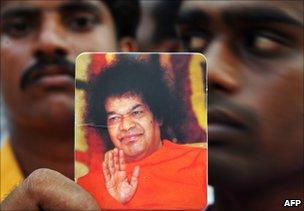Sai Baba death: Mourners flock to Indian guru's ashram
- Published
- comments
Thousands of Sri Satya Sai Baba's followers flocked to Puttaparthi where public mourning will continue until Tuesday
Tens of thousands of mourners have been visiting the south Indian ashram where the body of revered guru Sri Satya Sai Baba is on display.
The body of Sai Baba, who died in hospital of multiple organ failure at 84, is being kept in a transparent box at the temple complex in Puttaparthi.
Prime Minister Manmohan Singh is due to visit the ashram on Tuesday.
Sai Baba had millions of followers in India and around the world. But he was also dogged by controversy.
There were allegations, unproven, of sexual abuse and charlatanism against him.
Many devotees - who included senior politicians, business leaders, sporting heroes and Bollywood stars - considered him a living god and credited him with mystical powers including the ability to conjure objects out of thin air.
His trust financed health and education projects, among them hospitals and clinics that claim to cure illnesses beyond the capabilities of mainstream medicine.
Tributes
Hundreds of volunteers - men dressed in white trousers and shirts with blue scarves and women in saris and yellow scarves - have been guiding mourners around the glass casket where Sai Baba's body is being displayed.
A life-sized portrait of the guru stands over the coffin.
The body will be on display throughout Tuesday and hundreds of thousands are expected to pay their respects before the state funeral on Wednesday morning.
On Monday, cricketers Sachin Tendulkar and Sunil Gavaskar, both devotees of the Sai Baba, visited Sai Baba's home town Puttaparthi to pay their respects.
Sai Baba enjoyed tremendous popularity around the world - his photographs adorn millions of homes and dashboards of cars and his lockets are worn by many as a symbol of good luck.
Tributes have been pouring in since the death of the guru on Sunday with PM Manmohan Singh saying the Sai Baba will be remembered as someone who "inspired millions to lead a moral and meaningful life".

The late guru attracted followers across India's religious divide
Andhra Pradesh state has declared four days of mourning, with its top official calling Sai Baba a "symbol of love, affection and passion".
Indian television ran non-stop news coverage on Sunday of the guru's death, while officials and celebrities grieved for an "irreparable loss".
It is unclear who will run the trust set up by his devotees in 1972, now believed to be worth nearly $9bn (£5.4bn).
Sai Baba rose to prominence as a youngster after announcing to his family he was the reincarnation of Shirdi Sai Baba, a 19th Century Indian holy man equally venerated by Hindus and Muslims.
By 1950 he had built his first ashram, and in the following decades he built up a global following.
While his following spread worldwide, with ashrams in more than 126 countries, the guru was accused of faking some of his so-called miracles in which he conjured jewellery and Rolex watches.
Some former followers also accused him of sexually abusing young male followers.
The allegations were denied and he was never charged with any offence.